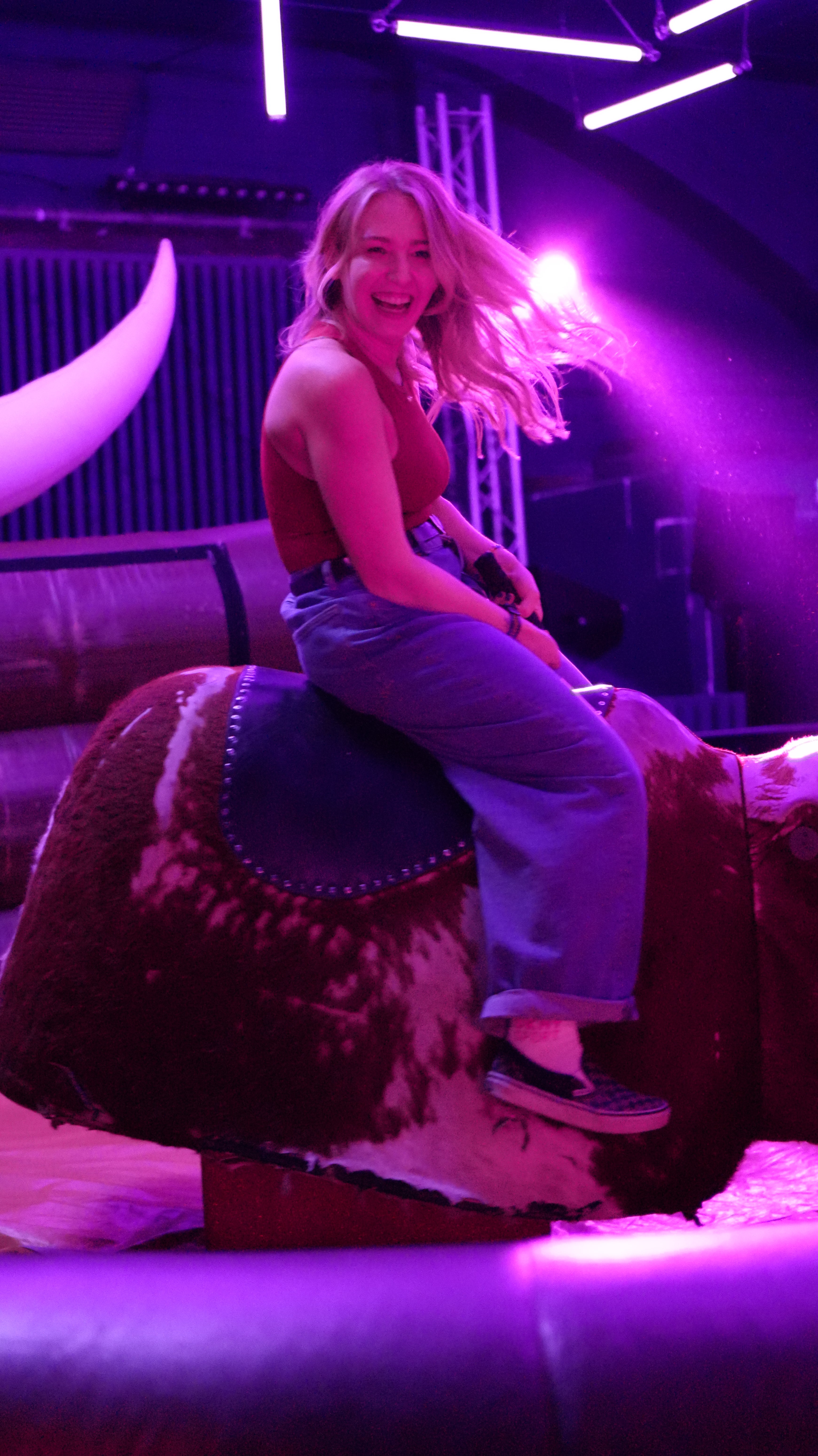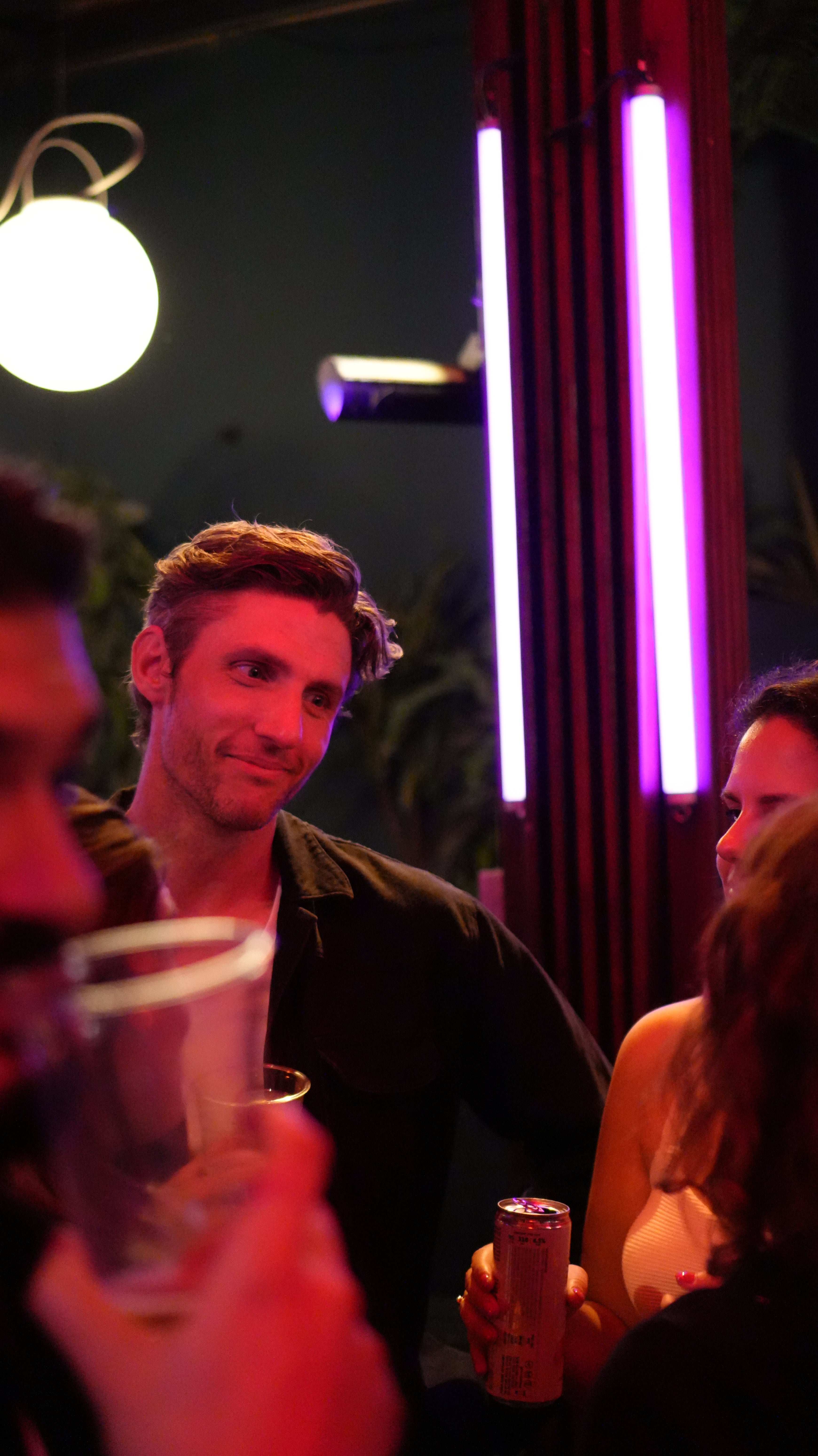Someone asks me if I’ve ever broken my collarbone. A man wants to know whether I had pet chickens as a kid. One woman walks around the room, her phone flung above her head, the screen displaying in bold block capitals: “DID YOU CYCLE TO BURNING MAN ON LSD?”
I’m not at an initiation ritual or a bizarre press conference, but at London’s newest in-person singles event, Haystack Dating. Founded by entrepreneur Lucy Rout, its aim is simple: Make Dating Fun Again.
“Dating has become like emptying the dishwasher,” Lucy says. “We used to get so excited, telling anyone who’d listen that we had a date that night. Now it’s like, ‘Oh, God. I have to go do this horrible thing. How can I get out of it?’”
Haystack is the first dating event I’ve ever been to. It’s their third and biggest one so far, but I was still expecting a fairly small crowd – maybe a few different groups milling around in a bar. But when I walk into Night Tales in Hackney, I’m confronted with a lot of people – 350, to be exact.
Haystack sits somewhere between speed dating (“Ugh,” Lucy groans, “Who needs that in their life?”) and being let loose in a room full of random singles. Haystack’s founding event was in Clapham, but they’re also venturing to Manchester and Bristol. Venues are always accessible, there’s a mix of ages (the average guest is 35), and unlike quite a few other dating events on the market, tickets are open to all sexualities. Lucy provides wearables to signify orientation – although almost everyone I speak to on the night turns out to be straight.
Before arrival, guests are asked to fill out a form and provide an interesting and unique fact about themselves. Haystack’s algorithm pairs guests with each other based on their answers and compatibility, but the event still requires a little work from each of us – we’re all told our match’s fact, but then left to find them on our own. The needle in the haystack, if you will.

Even before I get inside, I bump into a woman called Mairi near the cloakroom. We’re thrust together by Lucy, who’s sporting a huge fluffy bucket hat and greeting every guest by the door: “You’re best friends now!”
While waiting to get a drink, Mairi and I realise how much we have in common: both out of long-term relationships within the last year, both new to London, both navigating the joys and horrors of these facts. This became a pattern in all of my conversations. Someone just went on a clowning course – I have the word “CLOWN” tattooed above my elbow. Someone is German – my mum is from Frankfurt. But the greatest commonality is the response to, “So, how do you feel about the apps?”
Attitudes range from total hatred to a sort of exhausted ambivalence. “Men don’t know how to market themselves online,” Jess, a young mother, says. It all feels repetitive to her: “I can’t read another Hinge prompt about someone’s ideal Sunday being a roast and a pint. I just don’t have it in me.”
Demi is on all the usual sites but prefers in-person events. He shows me the Thursday app, which unlocks every Thursday for 24 hours. “You only have a day to get a girl’s number because all your chats disappear at midnight. It’s dating under pressure.” Dating with stakes!
The apps make rejection silent and comfortable
As it turns out, it’s these stakes that we’re collectively starting to seek out. Eventbrite reported that attendance at dating events increased by 42 per cent between 2022 and 2023, and more and more businesses are catering to this newfound demand. Thursday, which purports to be “the biggest IRL dating app in the world”, hosts weekly social events across 85 cities all over the world. Timeleft will set you up for a dinner party with strangers, while Gooce runs bougie supper clubs for singles. Breeze is a new dating app that takes online dating offline: “When you match, you can’t chat, but we’ll arrange your first date at a partner venue right away.” And then there are the themed dating events, which range from the cosy (“the Bookshop Meet-Cute” by Bored of Dating Apps, for the single bibliophile) to the eyebrow-raising (naked speed dating, anyone?).
Even comedians are having a go at matchmaking: Mike Falzone’s Human Romance show uses crowdwork and intuition to pair people up, because “comedians can read people”. The catch: your first date happens right then, onstage. But, if you (and the crowd) like each other, he’ll pay for your second.
So, if we’re all sick of the hellish cycle of the apps – and there are more and more IRL alternatives – why are so many of us still on them?
My theory: dating apps take the most uncomfortable part of dating (rejection) and gently fade it into the background until you don’t even realise it’s happened. When you “like” someone’s profile, they vanish off into the ether, and the next profile appears in front of you. You don’t know if that person you just “liked” has totally balked at the idea of going on a date with you specifically, or if they’ve just not picked up their phone in a few hours.
The apps make rejection silent and comfortable. If Hinge forced you to face this element – if it showed you a big red X and played an obnoxiously loud buzzer noise every time you liked someone who didn’t like you back – we’d barely make it a day before swiftly deleting our accounts.
Once you’ve spent a few months getting comfortable with this safe, sanitised non-rejection, the idea of walking up to someone in real life and potentially getting humiliated seems a horrifying and unnecessary form of self-torture. But Haystack makes it clear that there’s no gain without a little pain.
I’m immediately sold on the event’s fact-matching concept. Every possible pairing has the groundwork of at least two conversation-starters from which to explore and grow. You’re still doing the heavy lifting – Lucy can’t do your flirting for you, sadly – but it sets people up for success rather than leaving them awkwardly asking about work or hobbies.

It’s so effective for starting conversations, in fact, that it doesn’t even matter that I never actually got matched with anyone (I filled the form out late, or just fell through the cracks). If anything, my (pretend) indignation at not getting a fun fact to seek out becomes my fun fact. I almost completely forget that I’m at a dating event rather than an odd, human-orientated scavenger hunt.
What it also swiftly proves is that talking to people is not that frightening. Once you get over the initial fear, you realise how fun it is – the closest to playing that dating has ever seemed. And isn’t that what we’d all like dating to be, instead of the bizarre extra bit of life admin that it’s somehow become?
Something else I realise while I’m in the same room as the people I’d usually be swiping through online is that the odds are stacked against us on the apps. We’re in-person animals, despite working from home and the cost of living crisis keeping us out of public spaces. We’re finely tuned to scan body language, track eye contact and pick up on pheromones. Our coding as human beings can’t do any valuable work with static resources.
In an ideal world, you’re meant to see someone first and then work out what their job is and whether they have a pet cat which you’re ultimately going to be horribly allergic to. But dating apps place the details – name, height, location – before the really important part: do they catch your eye across the pub?
We’re in-person animals, despite working from home and the cost of living crisis keeping us out of public spaces
By the time I walk out of Haystack Dating, I’m fizzing with energy – so distracted that I almost don’t notice the man a few seats away from me on the tube. Which is surprising, considering he’s so my type it would make my best friend roll her eyes until they fell out of her head.
In the moment, I’m struck by the notion of GIVING IT A GO. Here’s a golden opportunity to put my newfound resilience to the test; after all, what harm has a little rejection ever done anyone?
I scribble my number on a scrap of my notebook. Then I write it out again because one of the sevens looked a bit weird. My hands are sweaty. My heart bubbles with all the nerves that had been lacking during the event. The number of stops before mine dwindles. I have a minute, max, to decide: am I brave enough?
Despite the best of intentions, someone walks across my path just as I’m about to accost my tube crush – it spooks me and I chicken out. Putting yourself out there is, as it turns out, much easier in theory than in practice.
But, had it not been for Haystack, the thought of handing my number over would have never even occurred to me. I’d argue that this is the reason in-person events are having such a resurgence: even if you don’t meet the love of your life, it feels much more real. Something has actually happened, and you have given yourself a proper chance, even if it ends up knocking you on your arse.
It’s impossible to judge chemistry from just six photos and a couple of words. That kind of test can only happen in a room – where rejection also exists. But what Haystack proves is that it’s a good start to be in the room at all. And maybe, next time, I’ll be brave enough.
Haystack Dating’s next events are in Manchester on 10 April, Bristol on 17 April, and London on 25 April. Tickets are £30 each, or, for some events, £25 per person for a heterosexual woman and her ‘referred’ heterosexual man.














